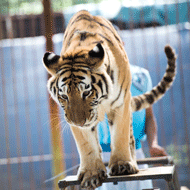Charity renews call to ban wild animals in circuses

A tiger owned by British cat trainer Alexander Lacey has been shot dead by police in the USA (Stock image).
A leading wildlife charity has renewed its call to the UK government to implement its long-promised ban on wild animals in circuses.
The call by Animal Defenders International (ADI) comes a day after a tiger owned by British by cat trainer Alexander Lacey was shot dead by police in the USA.
The tiger, named Suzy, escaped on Wednesday (6 September) whilst being taken from Florida to Tennessee. During a stopover in Georgia, Suzy entered a residential area and became aggressive to pets. As such, Georgia’s Department of Natural Resources deemed it necessary for public safety to put her down.
Transporter Feld Entertainment, the parent company of Ringling bros Circus, stated that didn’t know Suzy was missing until they had reached their destination, raising questions as to whether the big cats were properly checked.
Following the closure of Ringling bros Circus earlier this year, Mr Lacey plans to take his animals to a circus in Germany. An application to export the cats from the US was opposed by ADI and other groups as well as members of the public. The US Fish and Wildlife Service is yet to announce a decision on whether the permit is granted.
Tim Phillips, president of ADI, said:“When things go wrong in wild animal circuses they go seriously wrong. Aside from the public danger, this tiger has paid with her life for a human error, all in the name of frivolous entertainment.
“Alexander Lacey is heading to Germany but could be back in Britain whenever he likes with his lions and tigers living on the backs of trucks. We have had promise after promise that the government will ban this archaic cruelty. Do we really need yet another horrific expose of abuse or a tiger shot dead in the street for them to act?”
Over the years, ADI has recorded a catalogue of abuse at circuses owners by Alexander’s father, Martin Lacey Snr. They include tigers being hit with whips and elephants being abused, punched and hit with brooms. They also found that lions and tigers were being confined in transporters for periods of up to 27 hours.
In a statement, ADI said that, given constant travel and their temporary nature, ‘circuses cannot provide animals with adequate facilities to keep them physically of psychologically healthy.’
The organisation continued: ‘As well as vets, the continued use of wild animals in circuses is widely opposed by animal welfare experts, animal protection groups, politicians and a huge majority of the public. In response to a consultation by Defra on the issue, 94.5 per cent of respondents supported a ban.
‘Nearly 40 countries around the world have introduced prohibitions on animals in circuses to date. In the UK, the Scottish Government has recently introduced a bill to ban wild animal acts, while a similar commitment for England has yet to progress, despite legislation being drafted, scrutinised and ready to go.’



 The BSAVA has opened submissions for the BSAVA Clinical Research Abstracts 2026.
The BSAVA has opened submissions for the BSAVA Clinical Research Abstracts 2026.